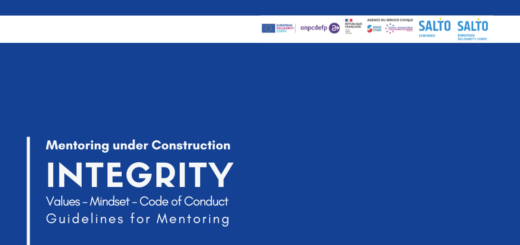A Mentoring Competence Framework for the European Solidarity Corps
![MuC Mentoring Competence Framework [title slide]](https://michaelkimmig.eu/wp-content/uploads/2024/12/MuC-Framework-title-800x450.jpg)
The Mentoring Competence Framework for the European Solidarity Corps has been developed by the Mentoring under Construction Community. This article is an update and walks you through the published version of the tasks and competences of the framework that has been launched in November 2024.
A mentor provides support and guidance to a young person during their volunteering journey.
Seek Clarity! A Mentoring Competence Framework for the ESC Programme
Mentoring is one of the main support measures of the European Solidarity Corps programme. Mentoring contributes both to the value of the volunteering project as well as the well-being of the volunteer.
This Mentoring Competence Framework was developed to provide a clear and effective guidance for mentoring practicioners. This includes mentors who would like to develop their mentoring competence and improve their mentoring practice, project coordinators who would like to set up and offer a quality mentoring programme within their organisation, facilitators and trainers who would like to design and carry out workshops and training courses on mentoring as well as National Agencies and SALTO Resource Centers that would like to support mentoring initiatives withing the ESC Programme.
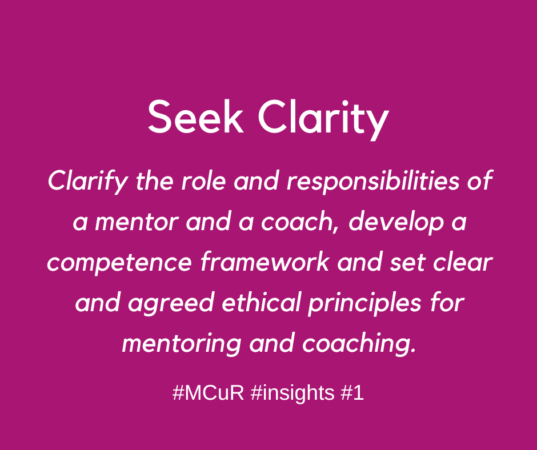
This Mentoring Competence Framework was developed by mentoring practicioners of the Mentoring under Construction Community, a community that supports learning and developing mentoring and coaching competences and helps improving the quality of mentoring and coaching within the European Solidarity Corps programme (and beyond). Find out more about how this framework was built at the end of this article.
The main purpose of the Mentoring Competence Framework is raise the quality of mentoring support within European Solidarity Corps projects providing a clear and effective guidance for mentoring practicioners.
tl:dr Hop over to the Interaktive presentation on genially and explore the framework!
Or, get a short overview first…
Building a Mentoring Competence Framework
Spotlight on mentoring!
The Mentoring under Construction (MuC) initiative took off in 2019 and brought together practitioners sharing a passion for mentoring and coaching. Initiated by the National Agency for Community Programmes in the Field of Education and Vocational Training (Romania) and the SALTO European Solidarity Corps Resource Centre, Mentoring under Construction aims to raise the quality of mentoring and coaching both within and outside the European Solidarity Corps Programme. Since 2020 Mentoring under Construction has been developing quality content to support the development of mentoring and coaching competences and refine practices in this area.
The state of mentoring within the ESC Programme
Mentoring and Coaching under Research (MCUR) explored and documented mentoring and coaching practices within the European Solidarity Corps Programme. One of the main insights from this research was the necessity to clarify the tasks of a mentor, to specify the competences and ethical practices required to fulfil the role of a mentor in ESC projects.
Seek Clarity! Building the Mentoring Competence Framework
The MCuR research served as a starting point for building the Mentoring Competence Framework, with its insights and recommendations providing a clear direction. The search for clarity became the key driver for a new initiative – a group of experts from the Mentoring under Construction Community formed a Task Force to kick-start the development of a competence framework for mentoring. The framework aims to clarify the tasks of a mentor, define the mentoring competences needed to perform these tasks and provide a set of ethical principles for mentoring.
The Mentoring Competence Framework contributes to the European Solidarity Corps Programme and provides clarity for the many actors in the field: mentors, project managers and project coordinators, trainers, authors and researchers.
![A Mentor’s Competence Framework [04]](https://michaelkimmig.eu/wp-content/uploads/2024/05/A-Mentors-Competence-Framework-04-800x450.jpg)
Understanding the Mentoring Competence Framework
What are the benefits of the Mentoring Competence Framework?
The Mentoring Competence Framework encourages the enhancement of the quality of mentoring support in European Solidarity Corps projects. The framework provides clear and effective guidance for mentoring practitioners while balancing the need for clarity with the flexibility required to adapt mentoring to the organisational and local context.
On a practical level, the Mentoring Competence Framework
- provides an architecture that aligns tasks, competences and ethical guidelines for mentoring,
- clarifies the tasks of a mentor, defines competences needed to carry out mentoring and offers ethical guidelines for mentoring,
- encourages mentors to continuously develop their mentoring competence,
- strengthens mentoring support and mentoring programmes within the organisation,
- provides guidelines for designing training courses for mentors and organisations.
In addition, the Mentoring Competence Framework
- recognises mentoring as a significant professional support measure,
- emphasises the importance and value of mentoring and the recognition of mentors,
- creates a common language for mentoring practitioners,
- encourages reflection, rethinking and adjustment of mentoring support,
- allows for the alignment of activities that enhance the quality of mentoring support.
A Mentor or a Mentoring System? – Mentoring support can be organised in various ways. One organisation may define and delegate certain tasks to one or several mentors, while others may establish a mentoring system in which tasks and responsibilities are shared among mentors and other staff members, depending on the needs and available resources. What matters most is to ensure that the various mentoring focus areas are covered and that the division of roles and tasks is clear for everyone involved in supporting the volunteer.
How do we understand competence and competence framework?
Competence is the ability to do something well (Cambridge Dictionary). Competences refer to specific tasks within a specific working context and are often described as a set of knowledge, skills and attitudes. Competences can be trained and developed.
Generally, a competence framework is a structure that defines competence and behaviours expected of individuals within an organisation. Ideally, it aligns necessary tasks with the knowledge, skills and attitudes that individuals need to effectively perform their roles and responsibilities.
Modern competence frameworks go beyond merely listing knowledge, skills and attitudes. They conceptualise competences to ensure and support not only the effective execution of specific tasks (“doing something well”), but also the demonstration of specific behaviours (“how to do something well”) that are required, valued, recognised and rewarded in a specific field. Additionally, a modern competence framework encompasses values, mindset and ethical practices as needed.
The Mentoring Competence Framework includes focus areas of mentoring (mentoring tasks), mentoring competences (described as knowledge, skills and attitudes) and guidelines for mentoring (values, mindset and code of conduct).
What is the structure of the Mentoring Competence Framework?
In line with the recommendations of the Mentoring and Coaching under Research report, a competence framework includes the following three components: the tasks of a mentor, the competences needed to fulfil these tasks and guidelines for mentoring.
The Mentoring Competence Framework consists of three parts:
PART A: Focus Areas of Mentoring – the different domains of mentoring, each with a list of specific mentoring tasks
PART B: Mentoring Competence – competences identified for each focus area, describing specific behaviours along with the knowledge, skills and attitudes necessary to demonstrate them effectively
PART C: Guidelines for Mentoring – important values and mindsets that underpin mentoring support, along with ethical guidelines for mentoring
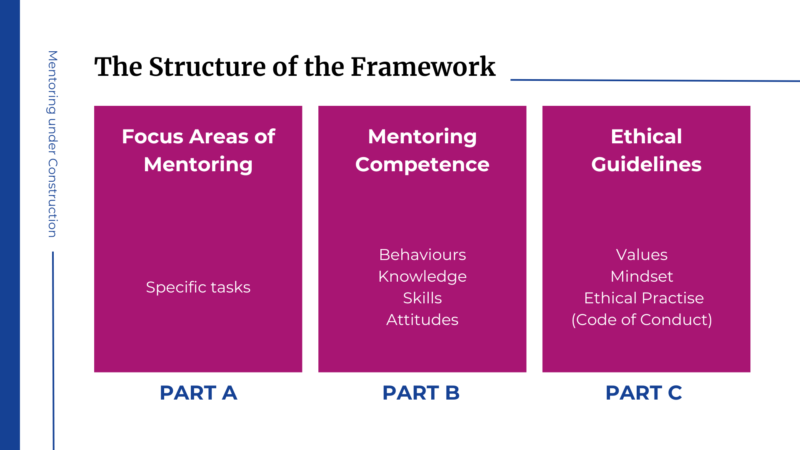
What’s important to keep in mind about the framework?
A mentor provides support and guidance to young people throughout their volunteering journeys. While this role may seem straightforward, mentoring within European Solidarity Corp projects can vary widely in practice.
The tasks, behaviours and competences outlined in this framework may not reflect the reality of mentoring support in a specific volunteering project, but you can be sure to find examples and good practices of mentoring support in our field that prove that they do exist.
In this way, the Mentoring Competence Framework is not intended to set a standard nor is it obligatory. However, the framework offers a powerful tool for developing mentoring competences and enhancing mentoring practices. It can help mentors and organisations to critically review the mentoring support, clarify core focus areas, define mentoring tasks and encourage the expansion and improvement of mentoring support within the organisation.
While mentoring should be tailored to the volunteer’s individual needs, it is also important to take into account the needs and resources of both mentors and the organisation. Organisations with fewer resources may prioritise basic support, such as assistance with local and cultural integration, as well as emotional support to ensure the volunteer feels settled and supported in their daily life. In organisations with more resources, mentoring can focus on more specific areas, such as planning and documenting learning outcomes or facilitating group and team activities. Such organisations may also be able to provide mentors with ongoing support and professional development, enabling them to take on additional tasks and responsibilities. In organisations hosting volunteers who require reinforced mentorship, mentors may need to prioritise creating and providing an accessible and safe environment that meets the volunteer’s unique needs, fostering a sense of inclusion and support. This adaptive approach to mentoring depends on various factors including the requirements, infrastructure, funding, staffing and available tools, which together influence how mentors – or the mentoring system – prioritise tasks and competences.
The list of tasks, behaviours and competences reflects the collective experience of mentoring practitioners within the ESC Programme. While comprehensive, it is not exhaustive; some may find it overwhelming, while others may feel it lacks certain elements. Keep in mind that the list offers a range of possibilities intended to inspire mentoring support within your organisation.
Introducing the Mentoring Competence Framework
The Mentoring Competence Framework is a flexible guide that can be scaled up as mentors and organisations gain more experience or resources.
PART A: 9 Focus Areas of Mentoring
Mentoring activities within the framework are summarised and divided into nine focus areas, each detailing specific mentoring tasks. The areas that are identified as essential based on the MCuR results as well as the experience of many mentoring practitioners are summarised in one core category: providing guidance. Other focus areas are considered additional (increasing impact) or optional (enhancing collaboration). This provides mentors and organisations with a clear orientation highlighting where to start and what to focus on.
The Tasks of a Mentor: 9 Focus Areas
- Assisting the volunteer in local and cultural integration
- Supporting the volunteer’s well-being
- Assisting the volunteer in dealing with difficult situations and conflicts
- Facilitating learning and development
- Raising awareness of the ESC Programme’s values
- Ensuring inclusion
- Facilitating orientation and integration with the organisation
- Managing groups and teams
- Planning, documenting and reporting
Source: Mentoring under Construction
In order to get a better overview, we put them in three groups:
- Providing guidance
- Increasing impact
- Enhancing collaboration
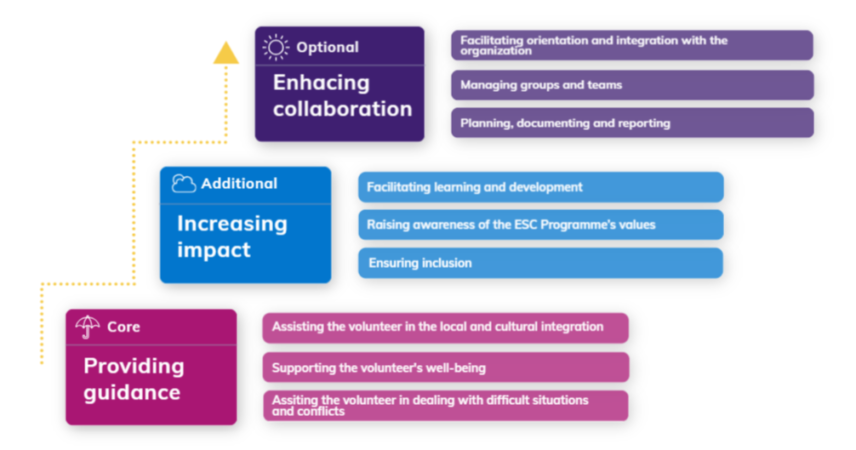
Providing Guidance (core)
The role of a mentor in providing guidance to volunteers is holistic, encompassing not only the specific tasks but also the personal and cultural aspects of the volunteer experience. As a support person, the mentor offers orientation, helps navigate challenges and ensures a positive, enriching experience for the volunteer. The core focus areas in providing guidance include:
- Assisting the volunteer in local and cultural integration
- Supporting the volunteer’s well-being
- Assisting the volunteer in dealing with difficult situations and conflicts
Increasing Impact (additional)
The mentor’s role in increasing impact involves fostering a culture of continuous learning and development, promoting the values of the ESC Programme and helping to create an inclusive and safe environment for the volunteer. The focus areas of increasing impact are additional and include:
- Facilitating learning and development
- Raising awareness of the ESC Programme’s values
- Ensuring inclusion
Enhancing collaboration (optional)
The mentor’s role is to encourage and empower volunteers to integrate and collaborate with others, enabling them to make meaningful contributions to the organisation. This may include providing ongoing training and regular feedback to the volunteer. Mentors also plan and document their mentoring activities and give feedback to the organisation to improve the volunteer’s experience and project outcomes. Enhancing collaboration includes optional focus areas such as:
- Facilitating orientation and integration with the organisation
- Managing groups and teams
- Planning, documenting and reporting
An effective approach to implementing and improving mentoring support is to start by providing guidance, which encompasses the core focus areas of mentoring. From there, additional focus areas can be introduced to increase the impact of mentoring, while optional focus areas further enhance collaboration.
Focus areas and specific tasks
Each focus area has a list of specific tasks. Here is an example:
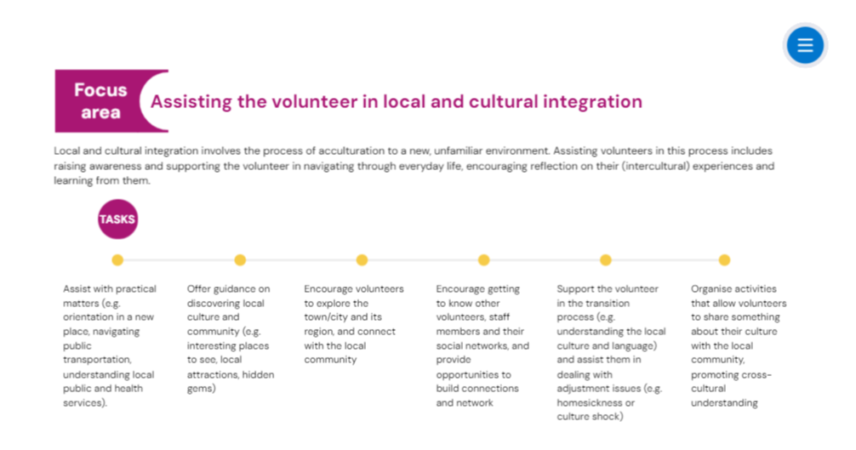
PART B: 22 Mentoring Competences
For each of the nine focus areas of mentoring, 2-3 mentoring competences have been identified and described in terms of specific behaviours that mentors demonstrate in this area, along with a set of supporting knowledge, skills and attitudes.
The behaviours and competences are organised around the three main categories: providing guidance (core), increasing impact (additional) and enhancing collaboration (optional). This structure offers mentors and organisations a clear orientation on where to begin and what to prioritise.

Providing Guidance (core competences, essential for all mentors)
Assisting the volunteer in local and cultural integration
- Facilitating cultural navigation and awareness
- Fostering intercultural learning and reflection
- Building trusting relationships
Supporting the volunteer’s well-being
- Raising awareness of well-being
- Supporting well-being practices
Assisting the volunteer in dealing with difficult situations and conflicts
- Providing support in managing difficult situations
- Providing support in managing conflicts
- Supporting (self-)regulation of emotions
Increasing Impact (additional competences, enhancing the impact of mentoring)
Facilitating learning and development
- Raising awareness of learning and development
- Supporting planning and implementation of learning and development
- Supporting reflection and assessment of learning and development
Raising awareness of the ESC Programme’s values
- Raising awareness of the Programme’s values
- Supporting alignment of activities with the Programme’s values
Ensuring inclusion
- Creating an accessible and safe environment for volunteers
- Providing reinforced mentorship
Enhancing collaboration (optional competences, enhancing collaboration and long-term impact)
Facilitating orientation and integration with the organisation
- Supporting the onboarding process
- Supporting volunteers’ integration within the organisation
Managing groups and teams
- Supporting team-integration process
- Supporting team cooperation
Planning, documenting and reporting
- Planning mentoring support
- Documenting mentoring activities
- Reporting to the organisation
Mentors embarking on their journey, along with mentoring organisations with less experience and fewer resources, can use these three categories as a step-by-step approach to implementation. These stages allow mentors and organisations to first focus on core areas of interest and mentoring competences, then gradually expand their mentoring capabilities as they develop. In the first stage mentors focus on critical competences for mentoring, such as building trust and supporting local and cultural integration. These skills are vital for ensuring the well-being of the volunteer and are often manageable for small organisations with limited resources. In the second stage, mentors can build on the core competences and move on to competences like facilitating learning and development or raising awareness of the values of the ESC Programme. This may require more training and organisational support, but it does enhance the overall volunteer experience. Finally, in the third stage, mentors can further expand their competences to include managing groups and teams as well as planning, documenting and reporting, as their capacity and experience increase.
PART C: 3×4 Guidelines for Mentoring
The third part of the framework is a compilation of guidelines for mentoring. In line with the holistic approach to non-formal learning – recognising that we all learn with our hearts, minds and hands- we have developed a set of 12 mentoring guidelines based on this principle.
Values – Mindset – Ethical practice
Values (heart) represent a set of principles and standards that guide our behaviours and actions. Mindset (mind) refers to the intentions and beliefs that help us navigate our decisions and actions. Ethical practice (Hand), or the code of conduct, encompasses a set of (written) rules and guidelines that ensure quality mentoring.
Heart, Mind and Hand
The four values that we consider the most important in guiding mentoring support are integrity, self-agency, dignity and togetherness. These four values serve as the first four guiding principles for the “heart”. In addition, four principles are formulated for the “mind” and another four for the “hand”. Together, these principles constitute the guidelines for mentoring.
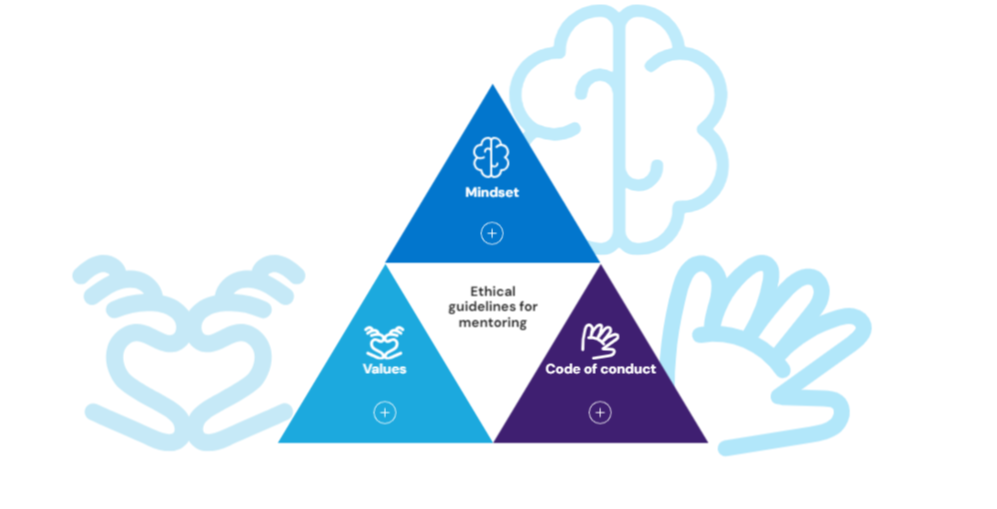
Why are values, mindset & ethical guidelines important?
Values, mindset and a code of conduct are the foundations of a competence model for mentors. They encouraging effective and ethical mentoring relationships and mentoring practice that support and guide the learning and development of volunteers.
Values, mindset, and ethical guidelines ensure…
- guidance and consistency: they provide a clear direction and guidance for the behaviour of mentors and ensure consistency within and across mentoring relationships,
- trust and credibility: these principles help building trust and credibility between mentors and their volunteers and create a safe and supportive environment for learning and development,
- professional development: they invite and encourage mentors to reflect on and improve their behaviours and practices and contribute to their professional development and effectiveness,
- positive outcomes: these principles help fostering positive mentoring relationships that enhance the learning and development of their volunteers.
Exploring the Mentoring Competence Framework
The Mentoring Competence Framework comes with a powerful tool to dive deeper and explore its content. This can be done in several ways.
For those of you who want to go through the framework slide-by-slide from start to finish, you can jump right over to the framework visualisation and explore the 9 focus areas of mentoring, 22 mentoring competences and 4×4 guidelines for mentoring.
Curious to find out more? Check out the following documents
- Presentation slides (see below)
- Interactive PDF (download)
- Interaktive presentation on genially
A Mentoring Competence Framework | Presentation Slides
A Mentor’s Competence Framework by TOSCA POOLApplying the Mentoring Competence Framework
The Mentoring Competence Framework can be used by anyone wishing to enhance the quality of mentoring support within the ESC Programme, for example mentors, project coordinators, facilitators and trainers, as well as National Agencies and SALTO Resource Centres.
Possible practical applications
…for mentors
- Clarifying and agreeing with their project coordinators the tasks they should focus on
- Self-assessing mentoring focus areas already covered and improving and/or extending mentoring support in particular areas
- Self-assessing mentoring behaviours and identifying knowledge, skills and attitudes to develop mentoring competences
…for organisations
- Reviewing mentoring focus areas and clarifying essential areas that should be covered by mentoring support
- Creating a mentoring profile based on the focus areas and mentoring tasks
- Agreeing with mentors on focus areas and specific mentoring tasks
- Supporting mentors in developing their mentoring competences and practices
…for TEC-trainers and NAs/SALTO
- Designing workshops and training courses for mentors and organisations based on the Mentoring Competence Framework
- Creating and disseminating guidelines that enhance the quality of mentoring support
- Investigating the quality and impact of mentoring support in ESC projects
Mentoring under Construction is committed to continuously creating and developing new mentoring content that matches the focus areas of mentoring, mentoring competences and guidelines for mentoring. This content is published in the form of newsletters, articles, podcast episodes and micro-learning sessions and is available on our MuC Learning HUB on Howspace and on the HOP Online Learning Platform.
Join our Mentoring under Construction Community
![Mentoring under Construction FB Community 2024 [Andreea Buzec]](https://michaelkimmig.eu/wp-content/uploads/2024/12/MuC-FB-Community-2024-Andreea-Buzec-862x450.png)
Mentoring under Construction (MuC) is a community of practitioners who share a passion for mentoring/coaching. The MuC Community is open for everyone who is interested in raising the quality in mentoring and coaching within European Solidarity Corps programme (and beyond) including mentors, project managers/organisers, coordinators of volunteers, facilitators of learning, authors and trainers, and members of National Agencies and SALTO Resource Centres. Mentoring under Construction was founded in 2019 by the Romanian National Agency for European Solidarity Corps with the support of SALTO European Solidarity Corps Resource Centre and is cooperarting with various other National Agencies.
Join us on Facebook, Howspace or Instagram! (linktree)

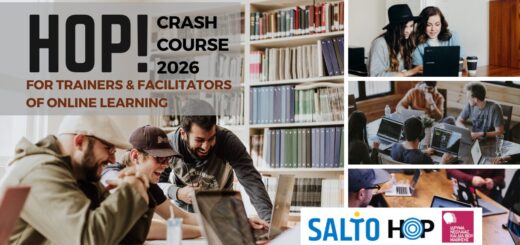
![Empowering volunteers [Pierre Bamin via unsplash]](http://michaelkimmig.eu/wp-content/uploads/2025/09/Empowering-volunteers-Pierre-Bamin-via-unsplash-520x245.jpg)
